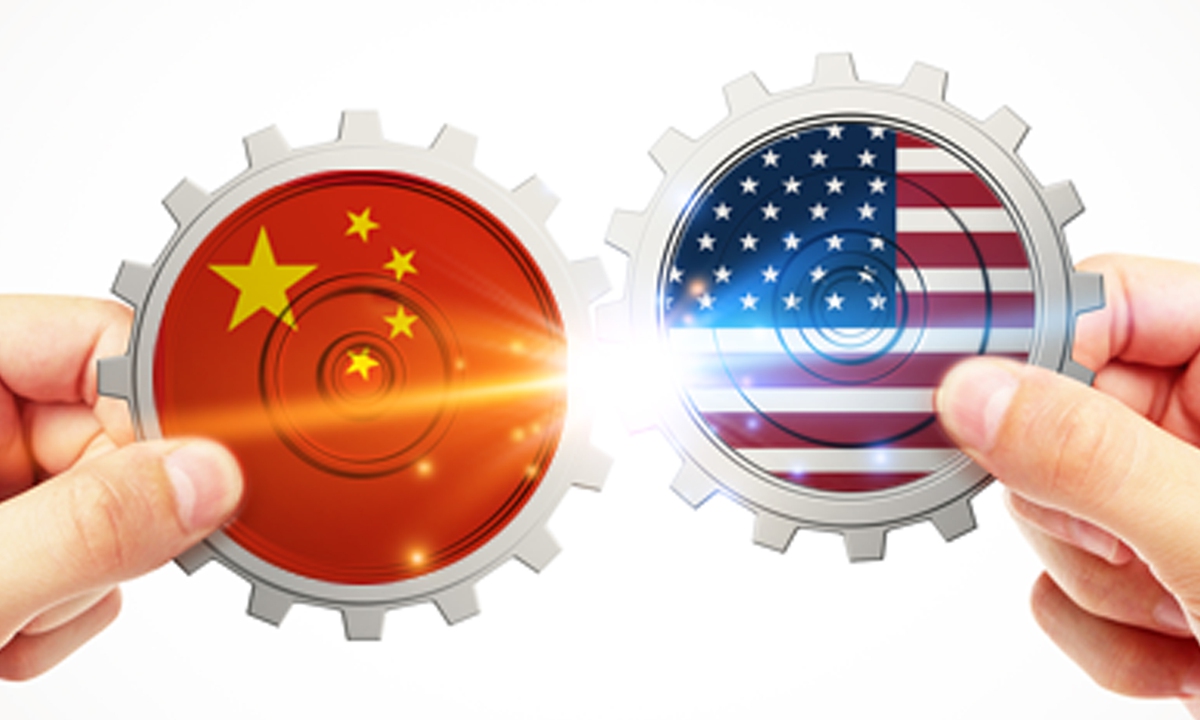
China-US Photo: GT
The latest phone call was held following Liu's phone talk with US Trade Representative Katherine Tai on May 27. These two phone calls mark the full recovery of communications between senior Chinese and US economic officials. This seems prominent in the context of the overall tensions between the two countries.
Since the US launched a trade war against China in 2018, bilateral relations have worsened rapidly. Some US elites' repeatedly mobilized the country to confront China, which has led the US to suppress China into high-tech decoupling and comprehensive strategic containment. Today, the US has used up most of its tricks. But in retrospect, the economic and trade war has produced almost no effect. China-US trade did not decline last year, and increased by about 50 percent in the first four months of 2021.
After more than three years of the trade war, we believe China and the US have had a better understanding of each other's strengths and the role played by the two countries' economic relations. In the current interactions between the two countries, the information released by senior economic officials turned out to be the most peaceful and positive. This has increased people's impression that the current China-US cooperation in trade and economy is calmer and more rational than in other areas.
Facts have proven that the economies of China and the US are inseparable. The Trump administration's imposition of high tariffs on Chinese products triggered fierce retaliation from China. However, trade between the two countries continued to rise sharply after a brief decline, The US hoped that a trade war could make the manufacturing industry return to the country and reduce its deficits, and that it could weaken China's economy to force Beijing to make political concessions. Yet none of these goals were achieved, and a large part of those additional tariffs were borne by US companies and families. It can be regarded as a conclusion that the US-launched trade war against China has been a terrible failure.
The US is more fragile than it was three or four years ago. Political shifts as well as the impact of the COVID-19 epidemic have further complicated US problems. Continuous quantitative easing has weakened global confidence in the US dollar. There are worries from time to time that the US may be on the verge of a new financial crisis. Today's US is quickly losing its resources to engage in an economic confrontation with China.
Regarding China as a strategic competitor and dealing with China with the general idea of decoupling is against the basic reality of China-US relations in the era of globalization. This will cause huge consumption to the US, which is unbearable for the country's long-term strategy. Roping in allies to forge a geopolitical alliance against China will never strengthen the US, because such a Cold War mentality is against other countries' priorities of increasing their competitiveness.
The US' awareness of crisis in the face of China's rise is not because its military superiority is severely challenged, or its alliance relationship has been gravely eroded by China's expanding influence. Instead, it is derived from its anxiety toward the relative decline in its economic strengths and dynamism. In a bid to tackle this biggest problem, the US needs to seek the answer from the reality forged by globalization. US moves to launch a trade war with and its attempts to decouple from China are cowardly actions, simply trying to console and embolden itself.
Over 120 countries are trading more with China than the US does. None of the US' allies are seriously willing to reduce their trade ties with China. Against this backdrop, if US companies decouple from China, it means they will lose the opportunity to become global top firms. This explains why many US firms have continued to ramp up their investment in China while the US is launching a trade war against China.
China's attitude has been very stable. We do not hope to confront the US. But if the US confronts China, we will embrace the challenges. Contrary to the bilateral political tensions, trade between the two countries has remarkably grown since last year. This prompts reflection on the possibilities of a new stable framework for US-China relations. We hope such push will yield positive results.

